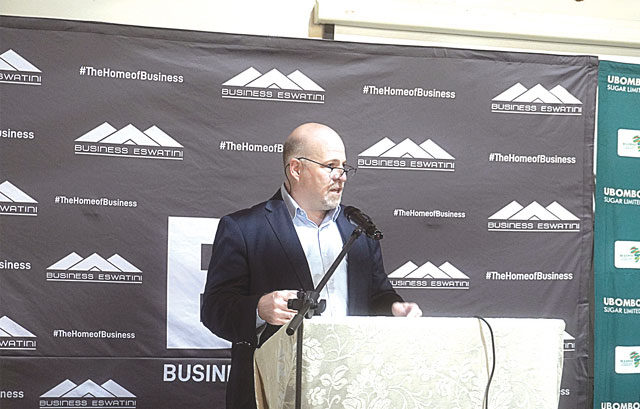By NOMFANELO MAZIYA | 2024-04-14

Business Eswatini (BE) Vice President Industrial Relations and Social Policy Committee Andrew Le Roux has highlighted concerned over an economy struggling to attract investment and generate employment opportunities.
This was during the first edition of ‘A Business to Government Engagement’ at Emafini Country Lodge yesterday.
"The harsh reality is that Eswatini is not creating any jobs, and we have not been doing so for quite some time,” said Le Roux.
He emphasised the critical role investment plays in job creation, particularly foreign direct investment (FDI).
However, Eswatini seems to be failing to attract this vital source of capital according to the VP.
Le Roux pointed to several factors hindering FDI in Eswatini.
One major concern is the perceived inefficiency of the court system.
"Our most recent competitive index ranking tells a worrying story," he said. "It highlights catastrophic inefficiencies in our courts, which discourages investors seeking a stable and predictable legal environment," he said.
Another factor discouraging investment, according to Le Roux, is the lack of protection for human capital. He said investors appeared hesitant to commit resources if they perceived a lack of safeguards for their workforce.
“Capital flows naturally to where it is appreciated and protected,” he emphasised.
Le Roux further criticised Eswatini's work permit policies, suggesting they make it difficult for skilled foreigners to enter the country.
This, he argued, sends a message that foreign expertise is unwelcome, hindering the transfer of knowledge and innovation crucial for economic growth.
“We chase foreigners away by not giving them work permits which means capital does not feel welcome,” he said.
The current approach to investment attraction seems to be backfiring, attracting the wrong kind of businesses, according to Le Roux.
"Because we are so uncompetitive and perform poorly in Ease of Doing Business surveys," he explained, "the consequence is that we attract fly-by-night operations and conmen, rather than serious, long-term investors," he said.
Emphasised
As an employers’ organisation, Le Roux emphasised that BE played a pivotal role in shaping policies that foster growth and stability, indicating that although progress had been made on the development and review of key pieces of legislation such as the Industrial Relations Act 2000 and the Employment Act 1980, ‘our plea is that these laws must carefully balance the welfare of workers with the sustainability of enterprises in Eswatini’.
“A balanced approach benefits both employers and employees, fostering a thriving economy,” said Le Roux. He further emphasised that Eswatini faced a pressing challenge; a significant skills mismatch within its labour market.
“The gap between available skills and industry requirements is alarming. Many graduates find themselves ill-equipped to enter the workforce due to the absence of specific skills demanded by employers,” said Le Roux.
He added that to address this issue, the country urgently needed a comprehensive framework and coordinated approach to skills development.
“Prioritising skills development is essential for overall growth. When individuals possess relevant skills, productivity increases, attracting investment, and creating better job prospects,” said Le Roux.
He advised investing in technical and vocational education and training (TVET) programmes calling it a ‘non-negotiable’.
“These programmes equip our workforce with practical, job-specific skills. However, achieving this goal necessitates collaboration among industry stakeholders, academia, and government. The current fragmentation in the education and skills development sectors seriously undermines government efforts in this regard,” said Le Roux.
NetComm Managing Director Mmilidzi Habangaan offered a thought-provoking solution to the skills gap challenge.
Acknowledged
He acknowledged the critical disconnect between the skills students acquire in educational institutions and the demands of the job market.
In a bid to bridge this skills gap, the MD offered a compelling solution, pledging their organisation's resources to collaborate with educational institutions.
NetComm Eswatini proposes to enhance capacity-building by collaborating with institutions to ensure the skills they provide are directly relevant to current industry needs.
The managing director emphasised the importance of ‘up skilling.’
This refers to equipping students with the necessary knowledge and abilities beyond their core academic qualifications.
He said it was important to equip graduates with practical skills and industry-specific certifications that are highly sought after by employers.
‘Something wrong with input subsidy programme’
Eswatini's agricultural sector faces a potential challenge of price manipulation by some businesses, which is affecting the ministry of agriculture’s input subsidy programme for Eswatini farmers.
Minister of Agriculture Mandla Tshawuka, during the ‘Business to Government Engagement’ at Emafini yesterday, acknowledged concerns raised by Bongani Mamba regarding speculation and price fixing in the market.
Mamba's worries stem from observations of businesses buying agricultural supplies at low prices and then selling them at inflated rates.
He said this created a supply-demand imbalance, making essential inputs unaffordable for many farmers, particularly small-scale growers. The minister confirmed these concerns, stating, "I have personally witnessed situations with the input subsidy programme and something is not going well.
There is a lot of speculation in the market." He emphasised government's commitment to addressing the issue, stating that they were actively investigating these practices.
Mamba proposed a solution of keeping subsidised farming inputs with EswatiniBank.
“This system would restrict the resale of government-subsidised supplies, ensuring they reach their intended beneficiaries – small and medium-scale farmers participating in the input subsidy program that supports over 5 000 farmers annually,” he said.
share story
Post Your Comments Below
Health officials have reported a significant decrease in new HIV infections among men, in...

THE recent turn of events at SwaziMed has underscored deep-rooted governance challenges that thre...
Social media users have reacted with shock and sorrow to the death of former Mhlume Unite...

Sisonkhe FC ……........….. (0)2
Mpendulo 55th, Thab...
All material © Swazi Observer. Material may not be published or reproduced in any form without prior written permission.
Design by Real Image Internet